The Reader is the online archive of Jeff’s writings on culture, politics, music, and more. It includes excerpts and outtakes from Can’t Stop Won’t Stop and interviews with Jeff. Articles are being added regularly, so come back often.

Published in Ilustríssima
Folha De São Paulo
October 4, 2010
+ Download the PDF (in Portuguese)
This piece was commissioned by Folha De São Paulo‘s Sunday magazine, Ilustríssima at the midpoint of Obama’s first term. It meant to capture the racial moment in the U.S. for Brazilian audiences, but it also reveals some of the themes and topics of Who We Be: The Colorization of America, due out on St. Martin’s Press in late 2011.
For most of 2008, the most arresting image in America was a screen print by the street artist Shepard Fairey that appeared on posters, stickers, and clothing from sea to shining sea. The image was of a Black and white man rendered in red, white, and blue. The man was named Barack Obama and the four-letter word below his image was HOPE.
Obama was, of course, the presidential candidate who had come from the far geographic and cultural edge of the United States, its Pacific border in Hawai’i, to secure the Democratic Party nomination. He ran on a platform of mending a divided country. In a speech in March called “A More Perfect Union”, he offered his own biracial heritage—the unity of Black and white histories in his own body—as a symbol of reconciliation.
That address, now popularly known as “the race speech”, was in some ways as historic as Martin Luther King Jr.’s “I Have A Dream” speech, delivered at the Lincoln Memorial almost 45 years earlier. “The complexities of race that we’ve never really worked through”, Obama said, remained “a part of our union that we have yet to perfect.” If Americans could move forward on race, he seemed to say, they could move forward on anything.
From the height of the civil rights movement through the Cold War into a new era of globalization, the United States has trumpeted the value of inclusion as central to its version of democracy. Yet any student of U.S. history knows that the reality of race has belied the nation’s image of itself. Race has driven four hundred years of civil and cultural schisms, and has brought the nation to the brink of dissolution. Race, another four-letter word, is still the most troubled national divide.
So when Barack Obama’s candidacy began to gather steam in 2008, some pundits wrote that it was a sign the rancor over race in America was finally dissipating. Obama dismissed the notion in his “race speech”, saying, “I have never been so naive as to believe we can get beyond our racial divisions in a single election cycle, or with a single candidacy.” Yet his triumph was epochal. In the glow of the historic victory of a Black biracial president, many declared that the U.S. had entered a “post-racial” era.
But in the summer of 2009, when, in a press conference, Obama said white police who had harassed the famous African American scholar Henry Louis Gates in a local incident had “acted stupidly”, he caused a national uproar. Conservative talk-show host Glenn Beck called Obama a “racist” who had a “deep seated hatred for white people or the white culture.” More recently the Obama administration fired African American official Shirley Sherrod after a conservative white blogger accused her of being anti-white in a speech to the NAACP. Sherrod—whose father had been killed by white racists—was in fact speaking candidly of how she had overcome her own prejudices against whites, and the administration hastily tried to rehire her.
During the hot summer months, opposition to Obama’s proposals have been mobilized by thinly veiled racial images. Last year some far-right Tea Party members protested the president’s health care reform package with picket signs depicting him as a witch doctor. Others circulated lies that he was Muslim or that he was not born an American citizen, stories that crystallized their beliefs in Obama’s inextricable foreignness. This year Beck drew thousands of Tea Party supporters to the Lincoln Memorial on the 47th anniversary of King’s “I Have A Dream Speech” to celebrate “the end of darkness.” Halfway through Obama’s first term, flare-ups over race have reached a velocity and pitch unseen since the so-called “culture wars” of the 1980s and early 1990s. Read more
Rap Pages
December 1994
By Jeff “DJ Zen” Chang and Mike Nardone
+ Download a PDF of the Original
In tribute to the great Rodger “Uncle Jamm” Clayton, we’re proud to bring back this feature that another legendary LA hip-hop DJ Mike Nardone and I were blessed to be asked to do by Sheena Lester for Rap Pages. Rodger Clayton, Egyptian Lover, and Iceberg were in the house.
We did the interview on June 28, 1994. I remember we met in a studio on the westside. I have lost my notes from the interview so I can’t remember the specifics of it all.
The real deal is that I had misplaced the tapes for years and, when I found them, I had only transcribed parts of the entire interview to use for Can’t Stop Won’t Stop. When Dave Tompkins was writing How To Wreck A Nice Beach, he asked about the tapes knowing of the Army’s vocoderistics and I lent them to him. Dave transcribed the whole shebang. (Thanks Dave!)
What follows are lengthy excerpts from those tapes. Some of it made it into the RP article, some of it didn’t. (There’s stuff in the RP article that isn’t below, either. So collect them all!)
Last note: Oliver Wang was fact-checking a piece the other day and started us on a convo about how Rodger spelled his name. The upshot is that we learned he spelled it both “Uncle Jam” and “Uncle Jamm”. The former was the name of one of George Clinton’s labels back during the era when Clinton was running game Wu-Tang style by recording under all kinds of aliases (and pissing off lots of execs because of that)–and P-Funk was Clayton’s influence. He seems to have added the extra “m” a little later as the crew became more widely known.
We want to dedicate this to the whole Army and to the Clayton family. Enjoy.
U: Uncle Jamm
E: Egyptian Lover
I: Iceberg
Uncle Jam/Egyptian Lover
Transcript
6/28/94
E: It all started with house parties.
U: First house party was right after I got out the ninth grade. I set up in my garage. I had a trip light. Remember the trip lights?
E: That’s all you needed.
U: I named my party Industrial Shop. I had the color organ. I had a speaker hanging in the corner. I had a little record player and ran the speaker into that and we were jammin’ Dr John, “Right Place, Wrong Time.” That was the first dance I did, that was in my garage. My graduation party after ninth grade. That was ’73. 1873!
ZEN: Reconstruction—after the Civil War.
U: I did that house party in high school. Charged like 50 cents. Made good lunch money. Good ass lunch money in 11th and 12th grade. Then I got outta high school and I was working at a factory six to six. And I gave a dance at the Sojourner Truth Mansion down on Crenshaw, across the street from the Kappa house. It was two dances going on. I had more people at my dance. Somebody from the Kappa House snuck across the street , found the electrical outlet switch and cut off all the power at my dance. Everybody left my dance and went across the street. I ‘ll never forget that. That was some fucked up shit man. Then my buddies Gabe Martin, who went to school with me–they had rented Alpine Village. They called me to DJ it and I DJed it and they had only 150 people. Said, “Let’s do this right.” Went back to Alpine—this was when we were called Unique Dreams. Egypt used to come and dance.
E: I was a big time dancer.
U: We gave our first dance. Had some posters. Even brought some radio—we brought KDAY. KDAY had little ten second spots where they used say it in ten seconds: “Uncle Jamm’s Army”. Used to sell ten second spots for like twenty dollars.
E: And they worked.
U: We used to buy ten second spots and we did that dance, our first dance at Alpines, called “Bustin Out.” Because “Bustin Out” was out by Rick James. We got like 500 people, man. After that we did “Bustin Loose” because Chuck Brown and the Soul Searchers was out.
E: Whatever the hottest song was out—they’d name the party after.
U: Back then, man, the music was incredible. It was just like funk, man. Read more
The Nation
May 4, 2009
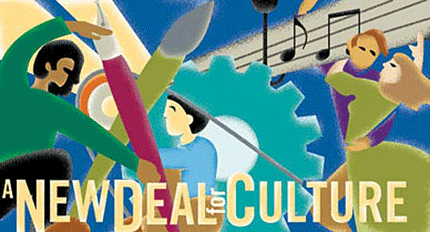
Image by Ennis Carter, Design For Social Impact
This piece began as a brief acceptance speech for my 2008 North Star News Prize Award. I was trying to spell out the key roles that journalists, artists, and organizers played in bringing about Obama’s victory, all jobs that were looked down upon and that I–of course–had held during the 20+ years of my so-called career. Katrina vanden Heuvel of The Nation liked it and commissioned it for the magazine.
Over the next three months, I found myself thinking about creativity’s role in social change around the world, from the Great Depression through now. Read more
The Nation
November 19, 2007

Before “Pineapple Express”, “Swagga Like Us”, “Slumdog Millionaire”, and a baby made her a global hip-hop heroine, there were a pair of albums. Times have changed. Junot Diaz won a Pulitzer, Obama was elected and the Tamil Tigers were routed. But here’s why M.I.A. mattered then…and still does now.
When she debuted in 2005 with Arular, critics couldn’t get over the package: the brown doe eyes, the cover model looks, the bracingly danceable music–not to mention the lyrics about war, terror and poverty. Read more
Vibe Magazine
September 2007
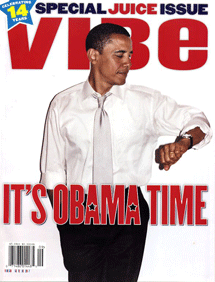
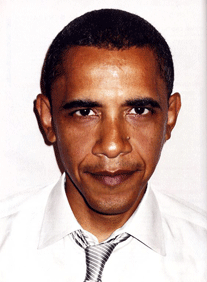
Can the freshman senator from Illinois stick to his ideals and still become the first man to rock Air Force Ones on Air Force One? We’re entering the mostly hotly contested election of our lifetime. It’s time to decide? Is Barack Obama our man?
On a Tuesday afternoon in May, the lines for a Barack Obama rally are as long as they would be for the rock concerts that are the normal fare here at the Electric Factory, a vast, converted warehouse in North Philadelphia. Read more
Salon.com
June 26, 2008

Rivers Crew in the flow. Photo by the incomparable magnificent Joe Conzo.
How did South Korea come to rule the b-boy world? What role did Asian Americans play? When I visited the 2008 R16 competition in Suwon, heads dropped a history of breaking and hip-hop in South Korea and Korean America on me…
This summer, the United States is reaching new heights of dance fever as TV shows like Fox’s “So You Think You Can Dance” and MTV’s “Randy Jackson Presents: America’s Best Dance Crew” have returned to the airwaves.
MTV’s runaway hit is considered especially cutting edge, showcasing hip-hop dance groups from across America. But if MTV really wants the best dance crew, it should be looking in South Korea. Read more
Village Voice
April 2002
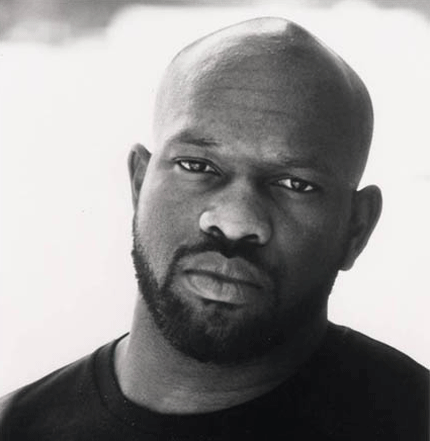
In 2002, then 33-year-old Bakari Kitwana ushered in a new era of hip-hop intellectual work with his book, The Hip-Hop Generation. Since that time, hip-hop studies has quickly expanded in the academy. Here’s a snapshot from that new dawn.
Without dogma or jargon, Bakari Kitwana’s important new book, The Hip Hop Generation: Young Blacks and the Crisis in African American Culture, cuts right to the chase. “What will be our generation’s contribution to the centuries-long African American struggle for liberation, and how do we redefine this struggle for our time?” he asks.
For us freedom-thinking young’n’s, Kitwana’s emergence as a young Black public intellectual is itself as important as the questions that he poses. Read more
How DJ Kool Herc Lost His Accent And Started Hip-Hop

…the logic is an extension rather than a negation. Alias, a.k.a.; the names describe a process of loops. From A to B and back again.
—Paul D. Miller
It has become myth, a creation myth, this West Bronx party at the end of the summer in 1973. Not for its guests–a hundred kids and kin from around the way, nor for the setting–a modest recreation room in a new apartment complex; not even for its location–two miles north of Yankee Stadium, near where the Cross-Bronx Expressway spills into Manhattan. Time remembers it for the night DJ Kool Herc made his name. Read more
Here’s a list of interviews Jeff has done on Can’t Stop Won’t Stop and other stuff. They are roughly in reverse chronological order since 2005.
You may use the search function on the site and blog as well if you’re looking for specific search topics. For whatever it’s worth, this guy has a lot of opinions on a lot of things.
Please let us know of any missing interviews that need to be added or dead links to drop or fix. We web gnomes will do our best to keep it fresh given the crappy salaries Jeff is paying us and our bad morale. Read more
In 2004, Oliver Wang sat down to talk with Jeff Chang on Can’t Stop Won’t Stop. Here’s what it sounded like…
Note: for a complete bio of Jeff, click to the Self page.
Q: Can’t Stop Won’t Stop is subtitled “A History of the Hip-Hop Generation”, which seems to me to be rather distinct from calling it “A History of Hip-Hop”. Is there a distinction between the two? Read more
Can't Stop Won't Stop Extras
- A Can’t Stop Won’t Stop Q+A By Oliver Wang
An exclusive interview about the book from 2004 - A Tribute To Richie Perez
The story of one of the Bronx greats–a Young Lord and a mentor to many. - Interviews With The Author
Four years of print, radio, and video interviews with Jeff Chang. You’ll laugh, you’ll cry, you’ll order Chinese. - Making A Name :: Book Excerpt
It has become myth, a creation myth, this West Bronx party at the end of the summer in 1973… - Writing The Book, Part 1
From 2003, the first blog post on writing “Can’t Stop Won’t Stop”. Can it be that it was all so simple then? - Writing The Book, Part 3 or 2.5
Another blog post on writing “Can’t Stop Won’t Stop” from the eve of release. Bonus angst: that vexing “Asian American question”.
The Reader Archive
- Welcome To The Reader
We’re working out the kinks in this as we both add more content and tweak the landing page. Please stay tuned.
Most Popular Topics
- 2008 Elections
Links to Jeff’s coverage of the 2008 elections for Vibe - Hip-Hop Activism
Links to some of Jeff’s articles on hip-hop activism - Music Writing
Links to some of Jeff’s stuff on music writing. Note: We’re currently trying to properly organize this section and upload lots more.

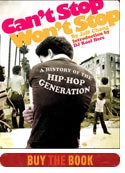
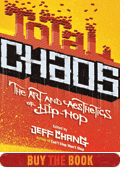
We work with the Creative Commons license and exercise a "Some Rights Reserved" policy. Feel free to link, distribute, and share written material from cantstopwontstop.com for non-commercial uses only.
Requests for commercial uses of any content here are welcome.


